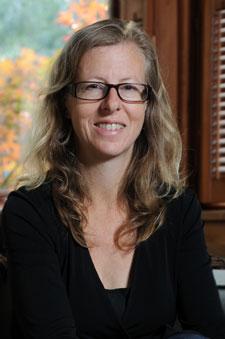One of Brenda Cossman’s priorities as the new director of the University of Toronto’s Centre for Sexual Diversity Studies will be making sure the quality of the parties doesn’t suffer.
“[Her predecessor] David Rayside threw great Centre parties,” she says. “I have to figure out the formula for that.”
Cossman — a professor in U of T’s faculty of law, a sometime columnist at Xtra and a board member of Pink Triangle Press, which publishes Xtra — will take over as director of the Mark S Bonham Centre for Sexual Diversity Studies in January.
She says she’s excited about the enthusiasm she sees in the Centre’s students.
“The kids that I have met really love it,” she says. “I come from the law school where noone talks about loving law school. Everyone hates it, even those people who love it.”
Cossman sits on the advisory board for the Centre but says she was surprised when she was approached by the search committee looking for a replacement for founding director David Rayside, who’s retiring. She says the centre was looking for a way to broaden its perspective.
“I come from a professional school,” she says. “This is a way of not just thinking about diversity studies as being sociology and philosophy and the humanities. It’s a way to reach out to the professional schools.”
Cossman, who specializes in looking at the legal struggles of the queer community, says her work around sexuality played a part in her hiring. She says the legal victories of recent years may also broaden the areas of academic study around sexuality.
“All the obvious stuff is pretty much done, the ridiculous fights for equality,” she says. “The remaining fights will be much harder to do as simple law challenges. If you’re coming at this from a queer perspective there’s a very strong question about what happens now. Others are going to be moving in different directions: from transgendered issues to sex workers, where we’re certainly not in a post-rights world.”
Cossman says she is excited about the centre’s new graduate program, which she believes is the first of its kind in Canada.
“This will make U of T even more of a cutting-edge centre in diversity studies,” she says. “There will be a lot of international students coming. It’s a really exciting thing for the future.”
Cossman says the growing presence of the centre at U of T fits in with a more widespread acceptance of sexual diversity.
“It is kind of reflective of the mainstreaming that comes with success that it’s being established around the same time as those legal rights. It’s reflective of the mainstreaming of the ’90s, but not the bad part of mainstreaming, not the complacency.”
Cossman says the centre has always had close ties to queer people in Toronto.
“Sexual diversity studies has always been supported in huge part by the gay and lesbian community,” she says.
Reaching out even more to the communities outside the university will be one of her priorities, Cossman says.
“Even from my work with Xtra I’m inclined to think beyond the walls of the university,” she says. “I’d be interested in trying to find ways to make more contact with the community. There could be more dialogue. I think about trying to use [the centre’s] website. At the moment it’s just a website serving a college program. It could be so much more.”
Cossman will still teach part-time in law but says she’s unsure if she’ll teach in her new job.
“It’s still a subject of negotiation,” she says. “It’s not entirely, or at all, in my control.”


 Why you can trust Xtra
Why you can trust Xtra


